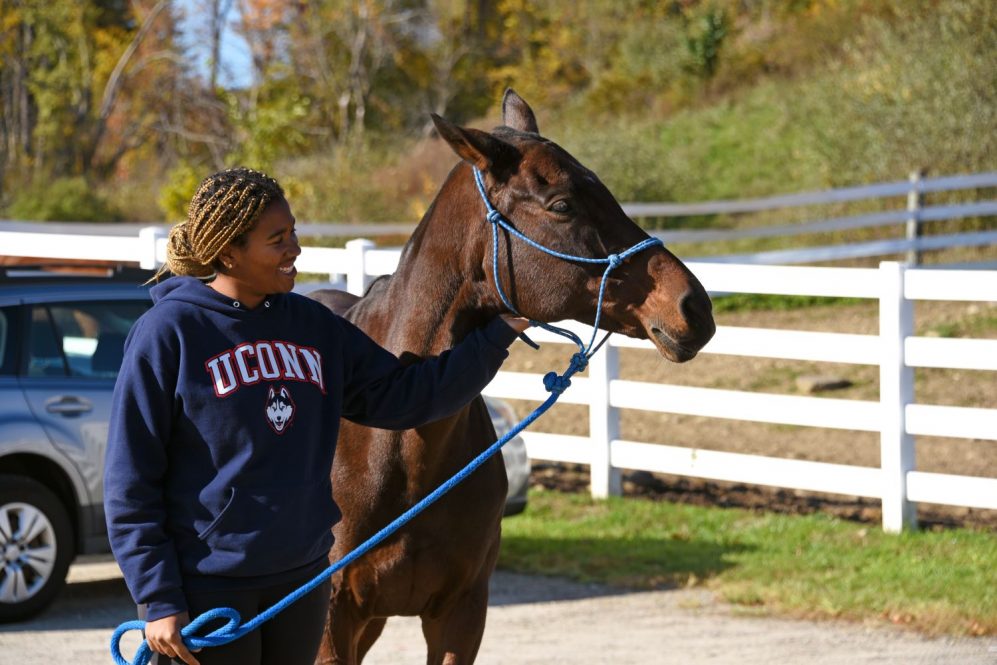Launching is fall 2026, the new major will meet student and industry demand

A student working with one of UConn's horses. (Jason Sheldon/UConn Photo)
The University of Connecticut is saddling up to meet a growing demand in the horse industry with the launch of a new Bachelor of Science in Equine Science and Management, set to welcome its first cohort of students in fall 2026. The University's Board of Trustees approved the program at their meeting this month.
Offered exclusively at the Storrs campus through the College of Agriculture, Health and Natural Resources (CAHNR), this new major will provide students with a unique blend of scientific rigor and hands-on experience that positions UConn as a leader in equine education across the Northeast.
Connecticut is no stranger to the equine industry. With the largest population of horses in New England and over 500 horse-related businesses, the state sees nearly $40 million in annual equine-related expenditures. UConn is uniquely suited to respond to this economic force - not just because of its location, but because of the depth of its resources, facilities, and expertise.
"We're not building from scratch - we're building on a strong foundation," says Pedram Rezamand, head of the Department of Animal Science. "UConn already has a robust equine program, and this new degree allows us to expand opportunities for students while supporting Connecticut's workforce needs."
The Department of Animal Science currently maintains a herd of 70 horses and supports competitive riding teams, a public riding lesson program, an active Morgan horse breeding program, and a wide range of teaching, research, and extension activities.
Students in the new major will engage in experiential learning from day one, whether it's managing horse care, training and breeding, or studying nutrition and equine physiology in cutting-edge facilities that include a 120-foot by 220-foot indoor arena with public viewing space, a breeding unit with laboratory space, and more than 50 stalls across multiple barns.
The new program also stands out in the region. As a result, students from New England often have to travel to states like Kentucky or Colorado to pursue specialized education in equine science. The UConn program fills this gap, offering a full, four-year degree with a curriculum tailored to the real-world demands of the equine industry. Graduates will be prepared for careers in equine health, breeding, facility management, training, business, and nonprofit sectors, with transferable skills in communication, leadership, and entrepreneurship.
"UConn's program is designed to be more than just academic, it's career-focused," says Rezamand. "We are working with industry professionals and our departmental advisory committee to make sure students will graduate ready to step into meaningful roles in the equine world."
Initial enrollment is expected to be between 30 and 40 students, with total enrollment projected to reach 160 within four years. Interest is already strong: 31% of Animal Science majors at UConn take at least one equine-related class, and nearly 20% of surveyed students said they would have chosen this major had it been available.
Importantly, the program also supports UConn's land-grant mission. It strengthens workforce development in a high-value regional industry, aligns with UConn's emphasis on experiential learning, and increases access to education through plans to apply for inclusion in the New England Board of Higher Education's regional tuition program. This would allow eligible out-of-state students to attend at a reduced cost, boosting the University's appeal throughout the Northeast.
Looking forward, UConn also plans to expand the program's reach by offering select courses in a hybrid format and developing an online certificate in Equine Science in the future.
"We're excited about the opportunity for students to turn their passion into a profession that this new major will provide, right here in Connecticut," says Rezamand. "It's a way for UConn to lead the region in preparing the next generation of equine professionals."






